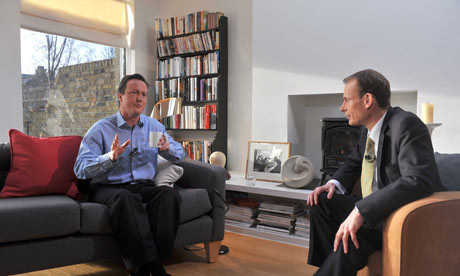
Someone once remarked that if John Smith was Labour’s old oak when he died in 1994, Tony Blair was its cucumber.
A lower middle class Scotsman by birth he was an Islingtonian by ambition, and a Tory in all but name.
His political apprenticeship was brief, his rise to power swift, and his roots in the Labour movement at best shallow.
Blair turned his amorphous appeal into an election-winning machine.
It’s become fashionable for commentators to talk about the resurgent tribalism of Labour politics lately. Alastair Campbell is a war-painted believer who will stick with the party through hell and high water, G2 tells us today. The Times’ Rachel Sylvester compares Labour to a dysfunctional family muddling its way through an awkward reunion.
Maybe tribalism is an epithet better suited to Labour than Conservatism, with the party’s heritage sunk in memories of miners’ marches and the grit of industrial Manchester. But the question of roots is just as telling.

On Sunday Dave invited Andrew Marr, and millions of prying eyes across the nation, into his living room. Inevitably within a few days the Guardian had zoomed in on his bookshelf and produced a reading list for aspiring Tory leaders. Among a spattering of modern political tomes and novels – Campbell’s diaries made the cut, as did David Mitchell’s Cloud Atlas – Alexander Solzhenitsyn’s August 1914 was the only pre-1990 book on Cameron’s shelves.
A mind uncluttered by the fripperies of culture clearly has its advantages – look at Tony Blair’s ascent to office – but a few roots and a bit of historical context aren’t to be sniffed at either – look at Tony Blair’s subdued exit 10 years on.
Dave was special adviser to Norman Lamont during Black Wednesday, an experience he doesn’t like to bring up too often. His rise through the Tory ranks since then has been smooth and accomplished. It’s unfortunate for him he’s not fighting the 1997 election, when that and the gift of the gab was all anyone really needed to win.
I saw him shoot a televised Q&A at the offices of the Manchester Evening News last week. His performance was decent, but it struck me he’s been in opposition for almost four years now – longer than Blair had to wait. The problem is that even good PR is time limited. There’s only so long a campaign can run without any really substance behind it. ‘Change’ is a great abstract noun, but the days when the public would indiscriminately plump for that are gone, as John McCain’s vapid incantations in the US proved.
Cameron could do with bringing some roots into the shadow cabinet. The question on everyone’s lips has clearly been whether he will bring in Kenneth Clarke and shift out George Osborne, although Cameron insists Osborne is essential to the next election campaign and a lot of Tory pundits worry Clarke would reopen the European question that’s scarred the party so deeply in the past.
Cameron faces some tough decisions in the next few months. In the meantime, he could do with a trip to Waterstones.